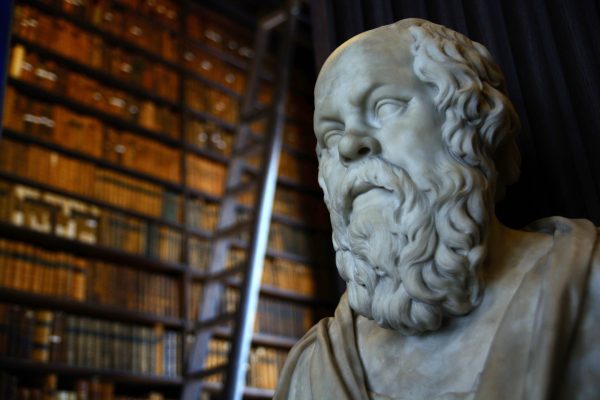The problem requires more than just a tweet to solve.
The Curriculum Needs Truth, Goodness, and Beauty, not “Decolonization”

A reconstruction plan for education
There is a rising tide in education of calls to “decolonize” the curriculum, the assumption being that, like an undeveloped country, the curriculum has been “colonized” by an exploiter class, namely European white men, who push aside valuable voices of the exploited classes.
This demand has two central motivations, one benign and one malign. There might be a legitimate claim that truly great voices have been excluded from the curriculum: perhaps ossified reading lists have prevented legitimate texts from appearing on those lists. This would be consistent with the recent excellent work of Eric Adler who, while defending the humanities from a traditional point of view, still argues, drawing from Irving Babbitt, that a more capacious understanding of the “the canon” might be in order. Put forth sincerely, this claim deserves serious consideration. In my own state of South Dakota, this often means adding more Native voices, to which I say “fair enough.”
But the more typical rationale for decolonizing the curriculum draws from Marxist ideology and the oppressor/oppressed dichotomy. Activists argue that, prima facie, any text from a white, male, Western source is suspect while texts from more “diverse” authors must be promoted. The upshot: teachers who gloat over removing The Odyssey from reading lists. At my own institution calls to decolonize the curriculum contain consistent references to Paulo Freire, the Marxist educator most famous for The Pedagogy of the Oppressed, grounding the paradigm of curricular decolonization in Marxist ideology.
Against a Marxist Curriculum
One would think we might avoid modeling our curriculum based on political ideology, much less an ideology that motivated the murder of one hundred million human beings in the twentieth century and continues to be the ruling ideology of the slavocracy of China. Additionally, the notion that human beings are locked into an inescapable relationship of oppressor and oppressed and in constant need of revolution is highly contestable, to say the least.
It is difficult, perhaps impossible, to design curricula based on power relationships that are highly complex to the point of inscrutability. The identities that drive “decolonization” efforts are extremely fluid. Today’s oppressed might be tomorrow’s oppressor and vice-versa. In America in the 1840s the Irish were considered a lower caste (recall the infamous “No Irish need apply” signs in storefronts). Southern and Eastern Europeans were looked upon with deep suspicion for their darker complexion and non-Protestant religion. (John Podhoretz has noted the joy his immigrant grandfather would have at the notion that his Jewish grandson is now considered a privileged white man.) In South Dakota we are rightly concerned with historical mistreatment of the Native population, in our case the Lakota. But we seldom ask about the Arikara, or Pawnee, or Crow, or Northern Cheyenne, all of whom could legitimately claim to have been violently dispossessed—by the Lakota. Most people have in their backgrounds some ancestry of oppressors and of oppressed.
A further assumption is that the Western canon is monolithic. So why is Aristophanes writing plays making fun of Socrates if they are both ancient Greeks, contemporaries even? Does Aristophanes criticize Socrates in the same manner as Nietzsche? Thomas Aquinas coopts Aristotle to strengthen Christian theology, while Thomas Hobbes rejects the whole Scholastic project. One could list dozens of examples. Does this sound univocal? To view a curriculum through an oppressor/oppressed lens is as unusable as the lazy division of society into proletariat and bourgeoisie.
The Marxist delineation of a curriculum into “good guys” and “bad guys” is hopelessly Manichean and serves as a poor guide. It sets up a potential for continual grievance that hardly is good for educational or political harmony. A simplistic view of history allows those who see themselves as good to set themselves up as potential oppressors, like Marx’s dictatorship of the proletariat, justified because the proletariat/colonized are considered free of sin while the bourgeoisie/colonizers are wholly guilty. The decolonizers fail to grapple with the reality, as Solzhenitsyn noted, that the line between good and evil does not lie neatly along race, class, or gender, but down the center of every soul.
Is “Practicality” Enough?
Another curricular model, sometimes favored by conservative legislators, is essentially practical. Education in this view is just the teaching of job skills. We see this in “outcome based education” (OBE) theories that measure student success based on acquisition of certain measurable competencies. This theory is increasingly popular in higher education. If the problem of the curriculum is that it has been politicized, then the solution is to rid it of any political overtones by making it serve the needs of the job market.
But vocationalism drives curriculum to a lowest common denominator. The desire today is to allow a student to take courses at various institutions (in person and online) to add up credit hours for a credential. We end up with a mediocre, skills-based curriculum. There is little room in this curriculum for the humanities and civic education. After all, what is the monetary value of Shakespeare?
This kind of education is deficient as it has transferred large amounts of influence to corporations that see us only as workers. As corporations become increasingly “woke,” they accept “decolonizing the curriculum,” as long as workers are trained. This view neglects the fact that workers are also parents, spouses, citizens, neighbors, leaders, etc. If we are merely concerned with practicality, what could be more practical than excellence in those roles? In addition, even with the increase in students pursuing higher education, still only about a third of American adults have a four-year college degree. It is from this population that we will choose most of our political and civic leaders. Maybe they need a greatness of vision, allowing for magnanimity and statesmanship, that a mere technical or vocational education will not provide.
Aesthetic Education
Our curriculum ought to help students experience and pursue the good, the true, and the beautiful. That is an aesthetic standard, not a political or vocational one.
Decolonizers like to argue that they are sticking it to capitalism, yet the decolonization standard, which liberates students from tradition, concedes the ground to capitalism even as it makes Marxist flourishes. As the Italian philosopher Augusto Del Noce noted, capitalism and Marxism are alike in having materialist roots. Del Noce argued that capitalism delivered on Marxist promises better than Marxism in that it was a more successful vehicle for the goal of liberation of the self from all customs and traditions. Corporate and academic elites seem hellbent on proving Del Noce right. If Marxism and capitalism are at war, it is a civil war, for they are both preoccupied with man as a cog in the machine of production.
An aesthetic standard is different. It recognizes that, if the line between good and evil does indeed run down the center of every soul, then the recognition and education of the soul should be the central task of education. That means teaching truth in all its complexity and irreducibility, truth that calls forth subtle contemplation and spirited discussion. What makes a “good book”? First, a good book has artistic quality in that it captures the imagination. Second, it defies easy agreement or disagreement. If I want to consider a piece by W.E.B. DuBois for one of my classes, I don’t ask, “What group does he represent?” or “How does this relate to historic power relationships?” but whether the piece speaks a truth in a beautiful way—the kind of truth best wrestled with through study and dialogue. Third, a good work bears multiple readings. Why is Shakespeare superior—not in a vacuum, but in a classroom? Because his works can be read multiple times and still provide new insights. “I sit with Shakespeare and he winces not,” Du Bois writes. “Across the color line I move arm in arm with Balzac and Dumas, where smiling men and welcoming women glide in gilded halls…. I summon Aristotle and Aurelius and what soul I will, and they come all graciously with no scorn nor condescension.” These are the signs of subtle and complex arguments, rooted in higher things still than identity or power. The very best presentation of these things are an educator’s highest standard, one that can and should be translated into various choices in curriculum.
A Marxist pedagogy says that truth is not to be had. “Truth” is a tool of the oppressor to control the oppressed. Education is not about pursuit of the truth, the good, or the beautiful, because these are all constructs of the ruling class meant to keep the oppressed class in its place. That’s why transgression is so central to the Marxist project, especially as translated through figures like Wilhelm Reich and Herbert Marcuse (“it is forbidden to forbid!”). Education, says the Marxist, is a constant struggle, a repeating Girardian mimesis of conflict that demands a scapegoat. As Jonathan Haidt has argued, drawing from Karen Stenner, this way of thinking only increases conflict and provokes rather than tempers authoritarian responses. We cannot have a college (together) or a university (a whole) if the basis of our curriculum is that human interactions are defined by power and the oppressor/oppressed paradigm. So colonization/decolonization, in their meaning and in their origin, are poison to true intellectual life, but are food for conflict, ideology, and a continuing cycle of retribution.
A university starts with a curriculum but has as its end people. When we view our curriculum through the lens of power struggle it will not be long before we start to see our students and each other in the same manner. This is a recipe for disaster, both collegially and educationally. The most important diversity at a university is diversity of opinion. It is a shame that our contemporary universities reject this principle. Let us hope this changes in the future, in an education rebuilt upon the true, the good, and the beautiful.
The American Mind presents a range of perspectives. Views are writers’ own and do not necessarily represent those of The Claremont Institute.
The American Mind is a publication of the Claremont Institute, a non-profit 501(c)(3) organization, dedicated to restoring the principles of the American Founding to their rightful, preeminent authority in our national life. Interested in supporting our work? Gifts to the Claremont Institute are tax-deductible.
an invitation to noncompliance.
A new project lays bare the use of public funds to promote hateful discourse.



